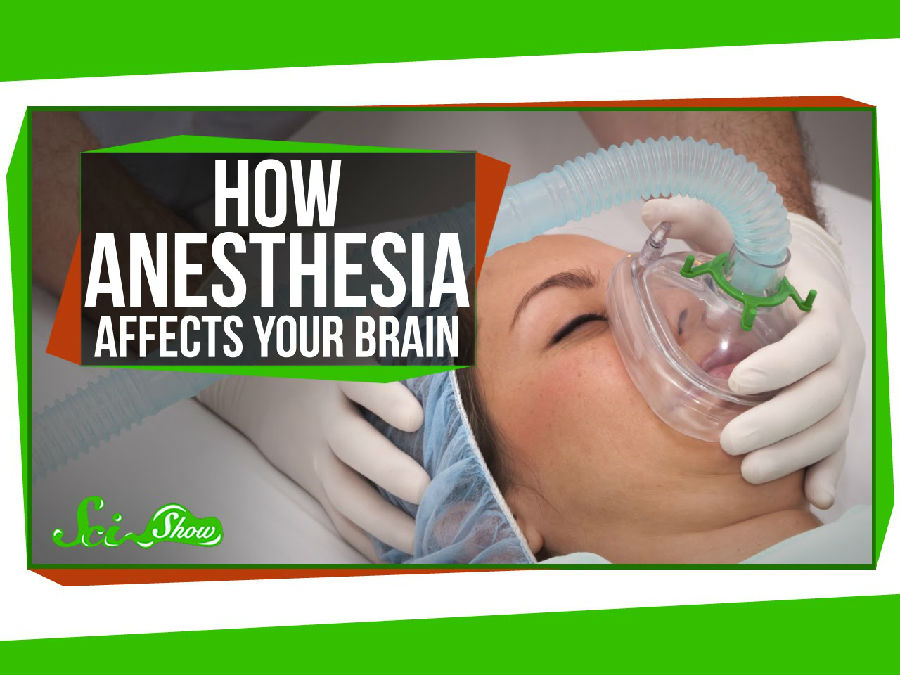I don’t mean to alarm anyone, but we don't really know exactly how general anesthesia works.
我不是想让大家恐慌,但是我们真的不清楚全身麻醉是如何起作用的。
We do know THAT it works, and that it's relatively safe.
我们又确实知道全身麻醉很有效,而且相对安全。
But scientists are still trying to figure out how all these different chemicals switch out the lights in your brain.
但科学家仍在试图弄清所有这些化学物质是如何断开脑袋里的信号灯的。
Anesthesia is a state where you're insensitive to pain,
麻醉是你感觉不到疼痛的一种状态,
and doctors use it so that when they need to get to your heart or kidneys or whatever,
因此当医生们需要对你的心脏、肝脏之类的做手术时,他们就会用到麻醉,
they can turn something invasive and traumatic into a peaceful nap.
他们可以使有攻击性、创伤性的东西安然入睡。
General anesthesia is the kind that knocks you out completely -- as opposed to local anesthesia,
全身麻醉能够让你完全不省人事——这个局部麻醉相反,
which just numbs a part of your body for a while, or twilight sedation,
局麻只是让你身体的一部分麻醉一会会或短暂的镇定,
where you're technically conscious but won't remember anything that happened.
从技术上讲你还是有知觉的只是完全不记得发生过了什么。
Usually, general anesthesia involves a combination of two drugs -- the first knocks you out fast,
通常,全身麻醉是两种药的结合——第一种药让你迅速不省人事,
and the other one keeps you that way.
另一种药能让你一直不省人事。
The anesthesiologist can fine-tune the dosage of the second drug to make sure you don't wake up too early, or go too far under.
麻醉师能够妥善掌控第二种药物的计量,让你不会过早醒来,也不会睡得太久。
So we know that anesthetics knock you unconscious, and we know that they keep you from feeling pain,
因此我们知道麻醉剂能够让你失去意识,我们也知道麻醉剂能够让你感觉不到疼痛,
responding to your environment and -- almost always -- from remembering what happened.
让你对周围环境不作出反应,通常还不记得发生过什么。
Which is a huge plus, because feeling -- and remembering -- being sliced up and stitched back together would not be pleasant.
这样也不错,因为感觉到并记得被切割和我被缝合的滋味也不是那么开心的事。
But anesthesia's not the same as going to sleep.
麻醉和睡觉不一样。
Some parts of the brain are still active, but unlike when you're fully conscious,
大脑的一些区域仍然活跃,但和完全清醒时的活跃不一样,
those active parts don't really communicate with each other.
这些活跃区域无法相互交流。
The brain patterns of someone under anesthesia don't look like sleep, either.
麻醉下的大脑模式和睡觉也不一样。
There's no rapid eye movement or dreaming under anesthesia.
在麻醉下,没有快速转眼运动或梦境。
Anesthesia brainwaves actually look a lot like the brainwaves of a coma patient…
事实上麻醉者的脑电波和昏迷病患的脑电波有点像
which makes sense, because anesthesia is a lot like a coma.
这也说得通,因为麻醉就和昏迷很像。
It's just reversible under the doctor's control.
只是在医生的控制下,麻醉是可逆的。
The weird thing is, this same anesthetic state can be brought on by a whole bunch of different chemicals
怪异的是,一大堆的不同化学物也能带来同样的麻醉状态
--from the noble gas xenon, to big molecules made up of rings of carbon.
从惰性气体氙到由一串碳组成的大分子。
Since all these different anesthetics do similar things, scientists figured they must have something in common.
因为所有这些不同的麻醉剂效果相似,科学家认为它们之间一定有相似之处。
And the most obvious one was that they almost all dissolve in oil… oils like the insides of your cell membranes.
最明显的是它们基本都溶解于油...就像是你细胞膜中的油一样。
For decades, researchers thought that anesthetics could dissolve in the membranes of your brain cells and disrupt them somehow.
几十年来,研究员认为麻醉剂能够在到细胞的膜中分解并以某种方式进行破坏。

But some compounds that are similar to anesthetics and very oil-soluble don't numb pain.
但一些和麻醉剂相似的化合物和非常油溶性的物质并不能麻痹疼痛。
And some anesthetics aren't very oil-soluble at all.
一些麻醉剂并不完全是油溶性的。
Instead, these days scientists think it has more to do with proteins, which have oily patches as well.
相反,近期科学家认为这和蛋白质更加相关,这些蛋白质也有油性斑块。
So anesthetics probably bond to proteins in your brain.
因此,麻醉剂可能和大脑中的蛋白质相结合。
But it's hard to study drugs that bond in an oily environment.
但很难去研究油性环境中的药物。
Anesthetics bond very weakly to the proteins they act on,
麻醉剂和对它们起作用的蛋白质之间的结合非常脆弱,
and it's hard to get them to stick in place for long enough to know exactly where they're stuck.
长时间让它们坚守其中很困难,因此没有足够时间查清它们被困在哪里。
The best understood anesthetic is also one of the most popular: propofol.
最好理解的麻醉剂也是最受欢迎的麻醉剂之一:异丙酚。
Propofol binds the receptor for a chemical messenger called GABA,
异丙酚捆绑化学信使——伽马氨基丁酸的接收器,
which is involved in controlling sleep and alertness, among other things.
它负责控制睡眠和警觉。
Propofol helps activate the brain's receptors for GABA --
异丙酚帮助激活大脑伽马氨基丁酸接收器
and researchers think it's especially active in the part of the brain that handles sleep.
研究员认为它在处理睡眠的大脑部分尤为活跃。
What we don't know is exactly how that part of the brain controls consciousness,
我们不知道大脑的那个部分到底如何控制意识,
and how propofol switches it off, and then back on again as soon as it goes away.
也不清楚异丙酚是如何将其关闭然后在其消失前再将其恢复的。
But, since studies have found that there's also a bunch of other anesthetics that also bind to the GABA receptor,
但由于研究发现还有其他麻醉剂也绑在伽马氨基丁酸接收器上,
researchers think they're on the right track.
研究研究认为它们是照着正确的路线运行。
There is one really strange thing we do know: Redheads need more anesthetic.
我们还发现一件很奇怪的事:红头发的人需要更多麻醉剂。
Doctors have been reporting cases of this for a while,
医生也一直在报告相关案例,
and at least one small study showed that redheads need 19% more anesthetic than people with dark hair.
至少有一个小的研究显示红头发的人比深色头发的人多需19%的麻醉剂。
According to the authors of the study, the gene that produces red hair color seems to be related to resistance to anesthetic,
该研究的作者称,红头发基因似乎和麻醉抗体有关,
especially since it's also been linked to pain sensitivity.
特别是它还和疼痛敏感度相关。
So we don't really know how general anesthesia works, but it's a good thing that it does.
因此我们不知道全身麻醉是如何起作用的,但全麻的作用还是不错的。
And as we study it, we're going to be learning more about how the brain is put together --
我们将继续研究更多关于大脑如何组装的知识
and maybe a little more about gingers.
也许会对姜黄人进行更多研究。
Thanks for watching this episode of SciShow, which was brought to you by Crash Course Anatomy and Physiology:
感谢收看本期科学秀,本期科学秀由Crash Course Anatomy and Physiology提供:
your opportunity to learn more about how your body works and do well in your A&P class...or just know more stuff about the world.
在这里你将有机会了解更多关于身体如何工作的知识,助你在A&P课中取得良好成绩...或是对世界了解更多。
You can find that at youtube.com/crashcourse where I host, and some other people host,
你可以登录youtube.com/crashcourse,观看由我和其他人主持的节目,
really great courses that you might not know about.
这可能是你从未了解过的课程。
I'm just guessing. Maybe you don't know about that thing, but it's really great! Check it out.
只是猜测。也许你不知道,但真的很棒!去看看吧。
If you want to see more of this though, go to youtube.com/scishow and subscribe!
如果你想了解更多,登录youtube.com/scishow进行订阅!











